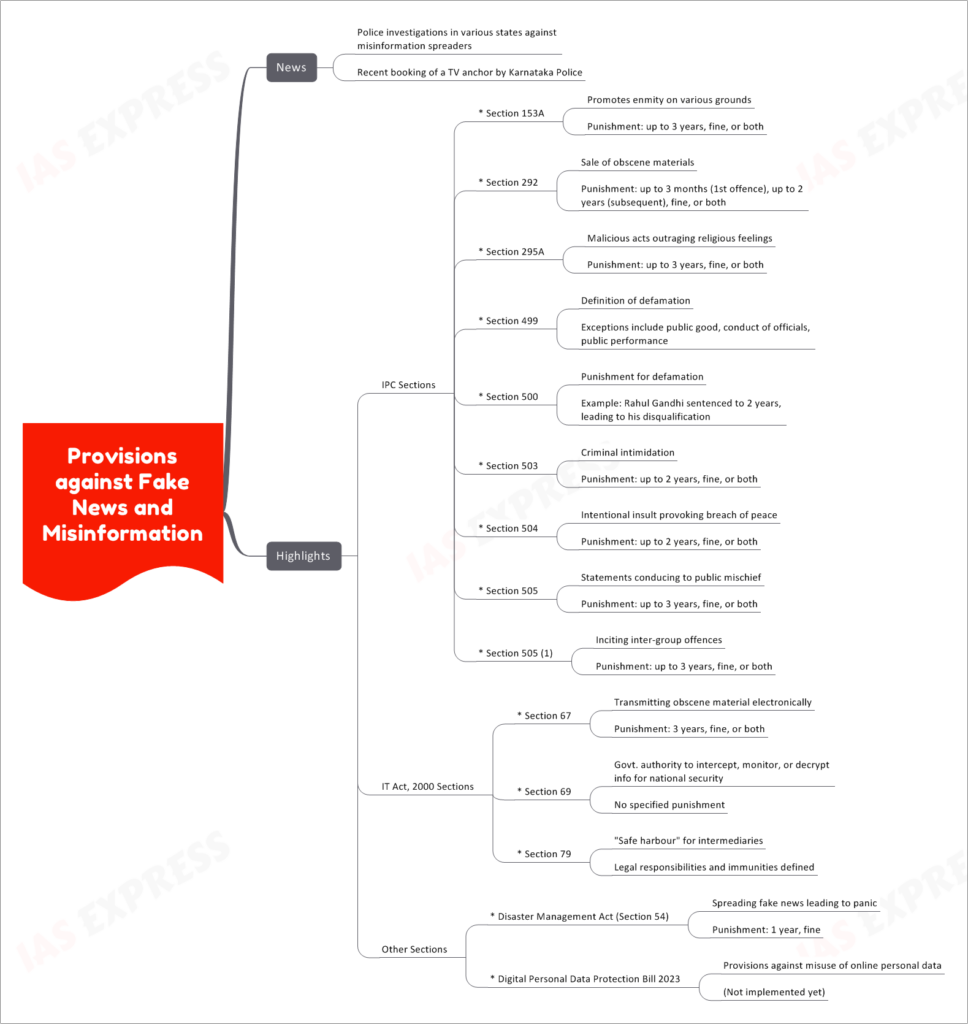Provisions against Fake News and Misinformation

In recent times, the spread of fake news and misinformation has become a global concern, and India is no exception. The Indian government and law enforcement agencies have taken various measures to combat this issue. This article explores the provisions against fake news and misinformation in India, highlighting key legal sections and acts that are instrumental in addressing this problem.
This topic of “Provisions against Fake News and Misinformation” is important from the perspective of the UPSC IAS Examination, which falls under General Studies Portion.
Recent Actions Against Misinformation
Police Investigations Across States
Indian police forces have initiated investigations in various states to curb the spread of misinformation. These investigations aim to identify and take legal action against individuals and entities responsible for disseminating false or harmful information.
Karnataka Police Booking of a TV Anchor
A recent incident involved the Karnataka Police booking a television anchor for spreading misinformation. This case underscores the seriousness with which authorities are addressing the issue of fake news.
Key Legal Provisions
Sections under the Indian Penal Code (IPC)
- Section 153A: Promoting Enmity on Various Grounds
- Punishment: Up to 3 years’ imprisonment, a fine, or both.
- Section 292: Sale of Obscene Materials
- Punishment: Up to 3 months for the first offense, up to 2 years for subsequent offenses, a fine, or both.
- Section 295A: Malicious Acts Outraging Religious Feelings
- Punishment: Up to 3 years’ imprisonment, a fine, or both.
- Section 499: Definition of Defamation
- Exceptions include statements made for public good, the conduct of officials, or public performances.
- Section 500: Punishment for Defamation
- Example: In the past, individuals like Rahul Gandhi have been sentenced to 2 years of imprisonment, leading to disqualification.
- Section 503: Criminal Intimidation
- Punishment: Up to 2 years’ imprisonment, a fine, or both.
- Section 504: Intentional Insult Provoking Breach of Peace
- Punishment: Up to 2 years’ imprisonment, a fine, or both.
- Section 505: Statements Conducing to Public Mischief
- Punishment: Up to 3 years’ imprisonment, a fine, or both.
- Section 505 (1): Inciting Inter-Group Offences
- Punishment: Up to 3 years’ imprisonment, a fine, or both.
Sections under the Information Technology (IT) Act, 2000
- Section 67: Transmitting Obscene Material Electronically
- Punishment: Up to 3 years’ imprisonment, a fine, or both.
- Section 69: Government Authority to Intercept, Monitor, or Decrypt Information for National Security
- This section grants the government the authority to intercept, monitor, or decrypt information for national security purposes without specifying a particular punishment.
- Section 79: “Safe Harbour” for Intermediaries
- This section defines legal responsibilities and immunities for intermediaries in the context of online content.
Other Relevant Provisions
- Disaster Management Act (Section 54): Spreading Fake News Leading to Panic
- Punishment: Up to 1 year of imprisonment and a fine.
- Digital Personal Data Protection Bill 2023
- This bill contains provisions against the misuse of online personal data, although it has not been implemented yet.

